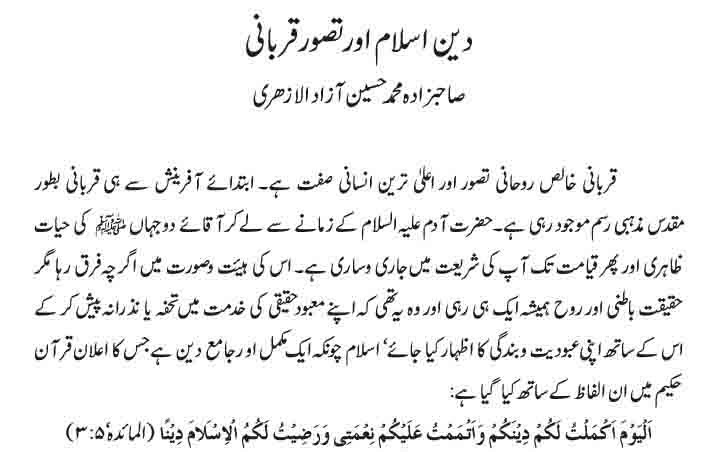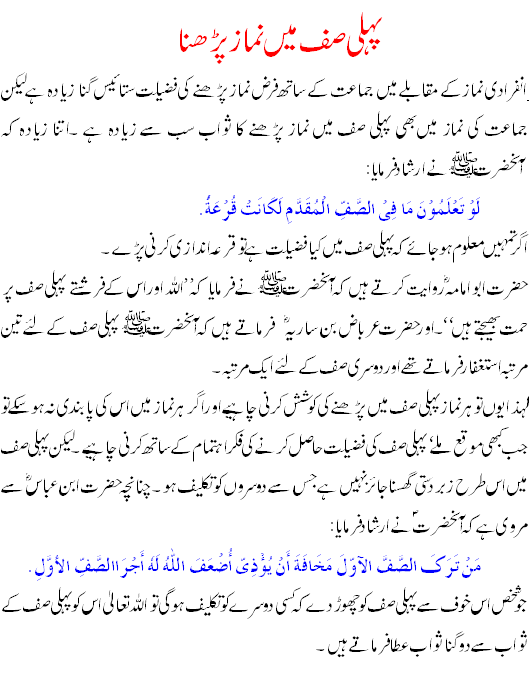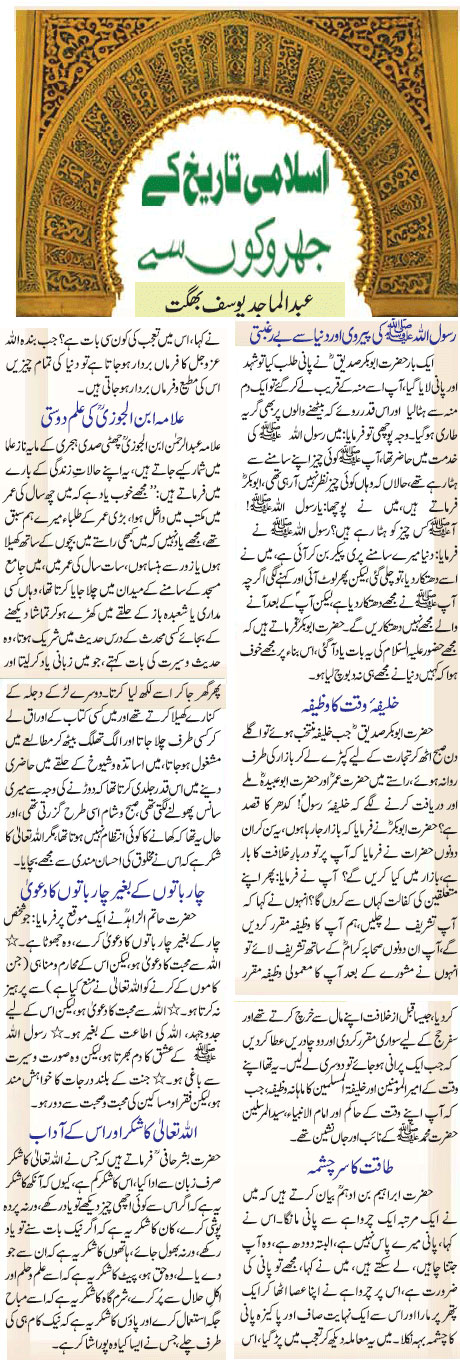


Beparda Khawateen Kya Gunah Kamati Hein
Archives
Responsibilities Of A Muslim
The long-standing political and moral decline of the Muslim Ummah has resulted, among other things, in a serious distortion of our very concept of Islam itself. We have grown accustomed to viewing Islam as a mere “religion,” instead of using the original Qur’anic term “Deen.” This apparently minor change in semantics is actually a huge leap backward. This is because the word religion is commonly used in a rather narrow sense, its scope is limited to a set of dogmas, some rituals for worship, and a number of social customs to celebrate important life events. Deen, on the other hand, is a system of life in which human beings consciously surrender to the sovereignty of a higher authority, and live a life of total obedience to that higher authority. In this sense, the term Deen can be applied to monarchy, where the king is accepted as the final authority, or to democracy, where the people as a whole act as sovereign. Thus, when the term Deen is used for Islam, it obviously means a system of life where the Almighty God is worshipped and obeyed, not just in the narrow religious sense, but in a manner that includes all aspects of human of life.
A well-integrated set of beliefs describing the nature of existence as it really is (Iman), modes of worship including Salat, Zakat, Saum, and Hajj, as well as social customs and ceremonies all comprise indispensable and integral parts of Islam. However, in addition to these “religious” features, we are also provided by the Almighty God with all the relevant instructions regarding our social, economic, and political existence (generally considered to be the “secular” elements of life), and this is what really distinguishes Islam from other religions, say, Christianity or Buddhism. Unfortunately, the majority of our masses are simply, and perhaps blissfully, unaware of what it really means to be a Muslim; thus, their concept of religious duties is usually very narrow and limited. But, as Allama Iqbal has so correctly observed, you begin to shudder with the fear of accountability once you realize the tremendous responsibilities that come with being a Muslim.
When Islam loses its political authority, it is relegated and dethroned to the status of a mere religion — a private affair of the individual; and if any particular generation is to revive the teachings of Islam in the social, economic, and political spheres, then this is impossible without adopting the same methodology as was adopted by Prophet Muhammad (SAW). After the independence of the Muslim lands from direct subjugation by Western Imperialism, it was naively believed that since political authority now belongs to the Muslims, the next step, that of implementing Islamic values, won’t be all that difficult. However, it has been proved during the last half century or so that the ideal Islamic State is still very much a dream, and since no shortcuts are available, we have no alternative except to start at the very beginning. We must remind the Muslims of their responsibilities. The significance of this subject is quite clear: We cannot hope to achieve salvation in the Hereafter without fulfilling all our obligations. Moreover, we cannot even think about the revival of the Muslim Ummah and the Renaissance of Islam without first inculcating the true concept of our Divinely ordained obligations in a significant portion of the Ummah.
OUR FIRST OBLIGATION as Muslims is to develop real faith and true conviction (or Iman) in the teachings of the Qur’an as explained to us by Prophet Muhammad (SAW). Faith must not be a mere dogma that has little or nothing to do with the practical aspects of one’s life, but it must be a deeply-felt certitude that changes the whole system of values, ambitions, and behavior in favor of Islam. Iman can be gained by reading, comprehending, and pondering over the meaning of the Holy Qur’an with a genuine search for truth. Knowledge of the Arabic language is indispensable for this purpose.
Hajj Sharait, Ahmeat Aur Fazeelat

Hajj Sharait, Ahmeat Aur Fazeelat
Deen-e-Islam Aur Tasawur Qurbani

Reward Of 10 Days of Dhu’l Hijjah
Among the great seasons of worship are the first ten days of Dhu’l-Hijjah, which Allah has favored over other days. It was narrated from Ibn ‘Abbaas (may Allah be pleased with him) that the Prophet (peace and blessings of Allah be upon him) said: “There are no days on which righteous deeds are more beloved to Allah than these ten days.” They said: “Not even jihad for the sake of Allah?” He said: “Not even jihad for the sake of Allah unless a man goes out himself for jihad taking his wealth with him and does not come back with anything.” Narrated by al-Bukhaari, 2/457
It was also narrated from Anas (may Allaah be pleased with him) that the Prophet (peace and blessings of Allah be upon him) said: “There is no deed that is better before Allah or more greatly rewarded than a good deed done in the (first) ten days of al-Adha.” It was said: “Not even jihad for the sake of Allaah?” He said: “Not even jihad for the sake of Allah unless a man goes out himself for jihad taking his wealth with him and does not come back with anything.” Narrated by al-Daarimi, 1/357; its isnaad is hasan as stated in al-Irwa’, 3/398.
These texts and others indicate that these ten days are better than all other days of the year, with no exception, even the last ten days of Ramadaan. But the last ten nights of Ramadaan are better than the first ten nights of Dhu’l-Hijjah, because they include Laylat al-Qadr, which is better than a thousand months. See Tafseer Ibn Katheer, 5/412.
So the Muslim should start these days with sincere repentance to Allah, then he should do a lot of righteous deeds in general, then he should pay attention to doing the following deeds:
1 – Fasting
It is Sunnah for the Muslim to fast on the first nine days of Dhu’l-Hijjah because the Prophet (peace and blessings of Allah be upon him) encouraged us to do righteous deeds in the first ten days of Dhu’l-Hijjah, and fasting is one of the best of deeds, which Allah has chosen for Himself as it says in the hadeeth Qudsi: “Allaah says: ‘All the deeds of the son of Adam are for him, except fasting, which is for Me and I shall reward for it.” Narrated by al-Bukhaari, 1805.
The Prophet (peace and blessings of Allaah be upon him) used to fast on the first nine days of Dhu’l-Hijjah. It was narrated from Hunaydah ibn Khaalid from his wife, that one of the wives of the Prophet (peace and blessings of Allah be upon him) said: The Prophet (peace and blessings of Allah be upon him) used to fast on the first nine days of Dhu’l-Hijjah and the day of ‘Ashoora’, and three days each month, the first Monday of the month and two Thursdays. Narrated by al-Nasaa’i, 4/205 and by Abu Dawood; classed as Saheeh by al-Albaani in Saheeh Abi Dawood, 2/462.
2 – Reciting tahmeed, tahleel and takbeer a great deal
It is Sunnah to recite takbeer (saying Allaahu Akbar (Allah is most great)), themed (saying al-hamdu Lillah (praise be to Allaah)), tahleel (saying Laa ilaaha ill-Allah (There is no god but Allah)) and tasbeeh (saying Subhaan-Allah (Glory be to Allah)), during the first ten days of Dhu’l-Hijjah, saying these words out loud in the mosques, homes, streets and every place in which it is permissible to remember Allah, to perform this act of worship openly and proclaim the greatness of Allah. Men should recite out loud and women should recite quietly.
Allaah says (interpretation of the meaning):
“That they may witness things that are of benefit to them (i.e. reward of Hajj in the Hereafter, and also some worldly gain from trade), and mention the Name of Allah on appointed days, over the beast of cattle that He has provided for them (for sacrifice)” [al-Hajj 22:28]
The majority are of the view that the “appointed days” are the first ten days of Dhu’l-Hijjah, because it was narrated from Ibn ‘Abbaas (may Allaah be pleased with him) that the appointed days are the first ten days of Dhu’l-Hijjah.
It was narrated from ‘Abd-Allaah ibn ‘Umar (may Allah be pleased with him) that the Prophet (peace and blessings of Allah be upon him) said: “There are no days that are greater before Allah or in which good deeds are more beloved to Him, than these ten days, so recite a great deal of tahleel, takbeer and tahmeed during them.” Narrated by Ahmad, 7/224; its isnaad was classed as Saheeh by Ahmad Shaakir.
The takbeer is as follows:
Allah akbar, Allaahu akbar, laa ilaaha ill-Allaah, Allaahu akbar, wa Lillaah il-hamd (Allah is Most Great, Allah is Most Great, there is no god but Allaah; Allaah is Most Great and to Allaah be praise).
And there are other versions.
This takbeer has become a forsaken Sunnah nowadays, especially at the beginning of these ten days. You can hardly hear it except a few. It should be recited out loud, so as to revive the Sunnah and remind the heedless. It was proven that Ibn ‘Umar and Abu Hurayrah (may Allah be pleased with them both) used to go out to the marketplace during the first ten days of Dhu’l-Hijjah, reciting the takbeer our loud, and the people would recite takbeer when they heard them, i.e., the people would remember the talkbeer and each one would recite it by himself; it does not mean that they recited in unison – that is not prescribed in shari’ah.
Reviving Sunnahs that have been forgotten brings a great deal of rewards, as is indicated by the words of the Prophet (peace and blessings of Allah be upon him): “Whoever revives one of my Sunnahs that has died out after I am gone, will have a reward like that of everyone who does it, without that detracting from their reward in the slightest.” Narrated by al-Tirmidhi, 7/443; this hadeeth is hasan because of corroborating reports.
3 – Doing Hajj and Umrah
One of the greatest deeds that can be done during these ten days is Hajj to the sacred House of Allah. Whoever Allah helps to go on Hajj to His House and do the rituals in the required manner will – in sha Allaah – be included in the words of the Messenger of Allaah (peace and blessings of Allaah be upon him): “An accepted Hajj brings no less a reward than Paradise .”
4 – Udhiyah (sacrifice)
One of the righteous deeds that bring a person closer to Allah in these ten days is to slaughter the sacrifice and to look for a good, fat animal, and to spend money on it for the sake of Allah.
Let us hasten to make the most of these great days, before the negligent regrets what he did, and before he asks to go back and receives no response
All praises and thanks be to Allah, Lord of everything that exists. The most Gracious, the Most Merciful.Master of the Day of Judgment You (alone) we worship, and You (alone) we ask for help. Guide us to the Straight Way The Way of of those on whom You have bestowed Your Grace, not (the way) of those who earned Your Anger, nor those who went astray. Ameen
Pehli Saf Main Namaz Perhna

Pehli Saf Main Namaz Perhna
The Power of Imaan
The famous general of Islam, Taariq Bin Ziyaad on receiving the command of the Khalifah, set off with a naval force of 7,000 Mujahideen to attack Spain. In the year 92 A.H., he landed at a place that now bears his name, viz. Jablut Taaariq or Gibral-ter.
During the voyage to Spain, he saw in a dream Rasulullah (sallallahu alayhi wasallam) giving him the glad tidings of him being the Conqueror of Spain. The first act executed by Taariq was to issue an order to set alight all the ships which had brought them to the shores of Spain. After having burnt out all the ships, he addressed his men: “In front of you is the enemy and behind you is the see.” In view of the glad tidings he had received from Rasulullah (sallallahu alayhi wasallam), he was confident of victory over the Christians. The Christian king Roderick confronted Taariq’s relatively small band of Mujahideen with a powerful army of 100,000.
The two armies – the army of Islam vastly outnumbered — met on the banks of the Guadalete River. The ferocity with which Taariq and his men fought routed the enemy resulting in a magnificent victory for the Muslims.
The act of setting ablaze the naval ships will undoubtedly be viewed as an act of insanity. Be it as it may. The power of Imaan is inexplicable to the people of the world. It was this power that drove Taariq to bum the ships and push on to victory.
The state of Taariq’s Yaqeen in Allah Ta’ala can be gauged from this episode which no one can ever accomplish. The state of the obedience of his troops also testifies to their degree of Taqwa. The troops readily submitted to the command. There was no fear and no mutiny. It was such states of Yaqeen and Taqwa that resulted in victory upon victory against overwhelming odds.
[By Hazrat Maulana Ahmad Sadeq Desai]
Jawahir Paare

Jawahir Paare
Did You Know – Hazrat Umar Farooq May Allah Be Pleased With Him
Allah Almighty we begin with His Name.
Choicest and countless Blessings and Salutations upon our beloved, the final Prophet Muhammad – may Allah Almighty send Peace and Blessings be upon him – and upon his noble offspring and illustrious companions.
Did You Know – Hazrat Umar Farooq may Allah be pleased with him
Q: What is the name of the second rightly guided Caliph of Islam?
A: Hazrat ‘Umar Ibn Khattaab – may Allah be pleased with him.
Q: What was his title?
A: Farooq Al-A’zam
Q: Which Caliph used to be awake at night to look after his people?
A: Hazrat Umar Farooq – may Allah be pleased with him.
Q: Which Caliph’s era is known as the era of victories?
A: None other than his.
Q: What was the duration of his Caliphate?
A: 10 years, 6 months.
Q: When did he become a Caliph?
A: Jumaad Al-Ukhra 13 A.H.
Q: Who was the first to make the Masjids bright with lamps?
A: Hazrat Umar – may Allah be pleased with him.
Q: In whose Caliphate was the Taraweeh Salah of 20 Rak’ats commenced?
A: In his Caliphate.
Islami Tareekh Kay Jharooko Sey

Islami Tareekh Kay Jharooko Sey

